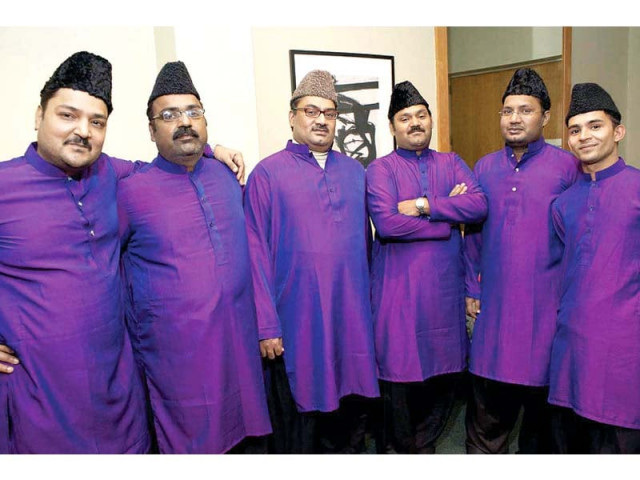Shunning mainstream qawwali
Najmuddin Saifuddin and Brothers are anything but your run of the mill performers.

The two hour qawwali session limited itself strictly to the works of Amir Khusro and Shams Tabrezi. PHOTO: FILE
Despite performing for over a decade, the qawwal group of Najmuddin Saifuddin and Brothers, adherents of the Khusro tradition, have not acquired the status of mainstream qawwals and it isn’t difficult to fathom why. They are selective about the kalam they sing, often choosing the philosophically dense works of Hazrat Shams Tabrezi and Amir Khusro, devoid of romantic undertones.
As people gathered in the main room of The Second Floor on Friday for a lesson in the tradition of qawwali and a two-hour long performance by the group, Mohammad Najmuddin, the lead singer of the troupe says, “Our selection will not change. But the special thing about us is that the Persian sufi kalam we sing is translated into Urdu as well for increased accessibility”.
During the performance, it was noted that Persian verses were immediately followed by Urdu translations in the very same wazn (the meter of a verse) — the credit of this meticulous translation going directly to Najmuddin himself. Najmuddin, who leads the troupe, has single-handedly produced many original Urdu translations of Persian work, and has conducted and produced research scholarships on the tradition of qawwalis in South Asia.
Belonging to the Qawal Bachay gharana of Delhi, adherents of the Chishti Sufi order, the Najmuddin Brothers had the main performing hall packed in no time, with several audience members standing, or resting against walls for lack of space.
Requests for Halka Halka Suroor and Mora Piya Ghar Aaya constantly echoed from various corners of the room, but the performance limited itself strictly to the works of Amir Khusro and Shams Tabrezi — the metaphysics of it challenging the disparities of the soul and body, and the heart and the mind.
The highlight of the performance, however, was a rendition of Amir Khuro’s Man Kunto Maula, which the troupe presented in their characteristic style — translated Urdu verses alternating with the Persian ones in the same meter.
While the Najmuddin Saifuddin brothers do have a select audience, it was clear that they were widely celebrated within that coterie. Those requesting for mainstream qawwalis were eventually seen to steal away after the first few kalams, while the true enthusiasts stuck around, drinking in the wisdom of the ignored, slightly more ponderous works of Amir Khusro, peppering the qawwals with crisp 100 rupee notes.
Another treat of the qawwali night was Najmuddin Saifuddin brother’s rendition of Aaj Rung Hai, which is usually sung at the end of qawwali performances. Though the Persian kalam has been sung by the likes of Nusrat Fateh Ali Khan, Abida Parveen and seven some of the modern vocalists such as Sahir Ali Bagga and Hadiqa Kayani, the Brothers’ version of it stood out because of their characteristic alaap and the use of dhol.
Published in The Express Tribune, April 20th, 2014.
Like Life & Style on Facebook, follow @ETLifeandStyle on Twitter for the latest in fashion, gossip and entertainment.



















COMMENTS
Comments are moderated and generally will be posted if they are on-topic and not abusive.
For more information, please see our Comments FAQ